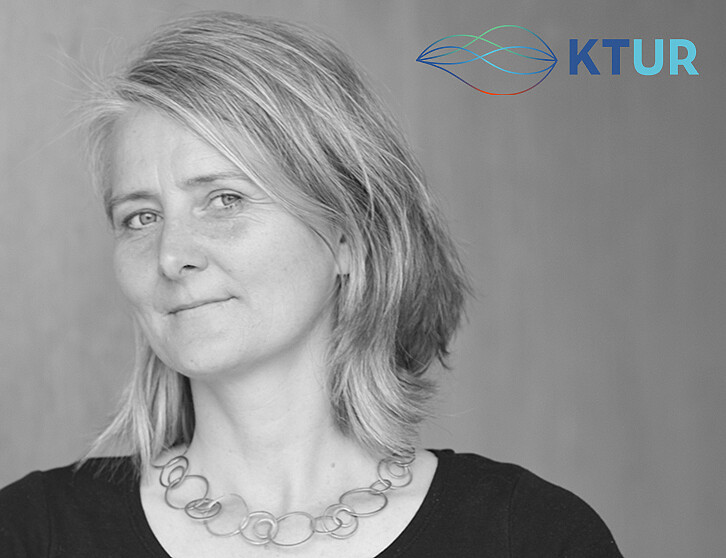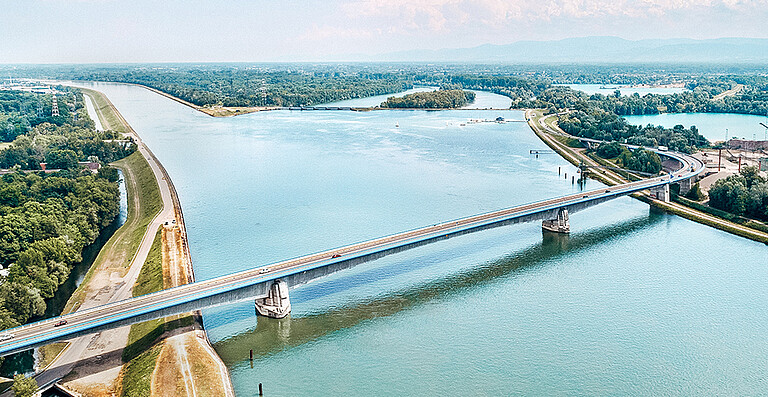Published on February 18, 2022
Professions in technology transfer: project leader
The EU project Knowledge Transfer Upper Rhine (KTUR) started in October 2019 and runs for a total of three years. The aim of the project is to boost the exchange between the knowledge and technology units of twelve universities and institutions of higher education in the tri-national area of Germany, Switzerland and France. Thereby, a network on the Upper Rhine, which is designed for the long term, shall be created and a common identity in the field of knowledge and technology transfer on the Upper Rhine shall be established. Several project staff members at the various institutions work on achieving this goal. The project leadership is established at the KIT: Ulrike Witt is responsible for the overall coordination of the project. In an interview, she tells us which tasks and challenges she manages in her multifaceted profession.

How did you end up in this job as a project manager for a third-party funded project?
Ulrike Witt: Like many others, I came to technology transfer as a career changer. Originally, I have a degree in geology and after my studies I was employed by an international company as a project developer for solar parks in Germany, Greece and France. After living in France for a few years and working as a project manager for a small French company, I decided to return to Germany. I found the strategic project KTUR very exciting and became project coordinator in the team Technology Marketing and Transfer (TMT) at KIT in 2019.
„For this position, I think my language skills, as well as experience from previous jobs as a project manager, have distinguished me, as well as my enthusiasm for multicultural, cross-border cooperation.“
Ulrike Witt
Why did you choose a career in technology transfer?
Ulrike Witt: It was more by chance that I ended up in this field. But looking back, I'm grateful to work in such a dynamic environment. In addition to the organizational and coordinative tasks that suit me, I appreciate the exchange with different groups of people. It is not only the transfer of knowledge among the transfer offices that is promoted, but also the interface with the economy.
What are the requirements for this profession? What skills should you have?
Ulrike Witt: Anyone who coordinates a project - especially supra-regionally with external partners - should definitely be able to organize and coordinate well. An academic degree from a (natural) science program is an advantage in order to cope in a technical environment. Anyone who enjoys dealing spontaneously with a wide variety of organizational, content-related and legal issues will probably feel very comfortable with this profession. Of course, you should also enjoy working with many people towards a common goal. In the role of project leader, you need a high degree of empathy and moderation skills: To understand the project partners and to consider different perspectives. The needs between the stakeholders have to be balanced in order to achieve an overall result that everyone shares.
What does a typical day look like for you? What exactly does your job entail?
Ulrike Witt: In my daily work, I have to get an overview of how far the project partners have progressed in implementing their goals and what challenges they are currently facing. Therefore, I am in direct contact with the project staff of the partner institutions. I also spend a lot of my time organizing workshops and meetings, as well as reporting in order to document project progress in a way that is comprehensible to the public funding organizations. To ensure that project funds are actually disbursed, there has to be close consultation with the main funder. Classic project management is also part of the process: Controlling for adherence to defined goals on time and within budget.
Why does KIT need project leaders?
Ulrike Witt: Funding with third-party revenues is an essential component of research institutions and generally in universities. The funding is important to enable knowledge building and to secure it financially. Therefore, KIT needs employees on an administrative level who attend to project management. On the one hand, to qualitatively advance research within the funding projects or, on the other hand, to coordinate a bundle of concrete activities behind which there are higher-level political goals or perhaps even visions – as in the case of KTUR as a strategic project in technology transfer.
What do you like about your job?
Ulrike Witt: The job is already exciting because of the trinational aspect. Thanks to the many video conferences in the home office over the last two years, people from France, Switzerland and Germany have virtually visited me in my own living room. It is fun to experience the developments, how the ideas defined at the beginning become reality in very different areas.
The variety of activities in the KTUR project is impressive: In March, for example, one of the cross-border continuing education programs will start. Participants can familiarize themselves with machine learning in a course lasting several days. In addition, a digital modular knowledge and technology platform is currently being created, as well as innovation events and many offers for start-ups. This year's highlight will be the Innovation Day Upper Rhine on April 12, 2022. All offers and activities of KTUR can be found on the website!
The interview was conducted by Dominic Mack.


comments about this article
No Comments